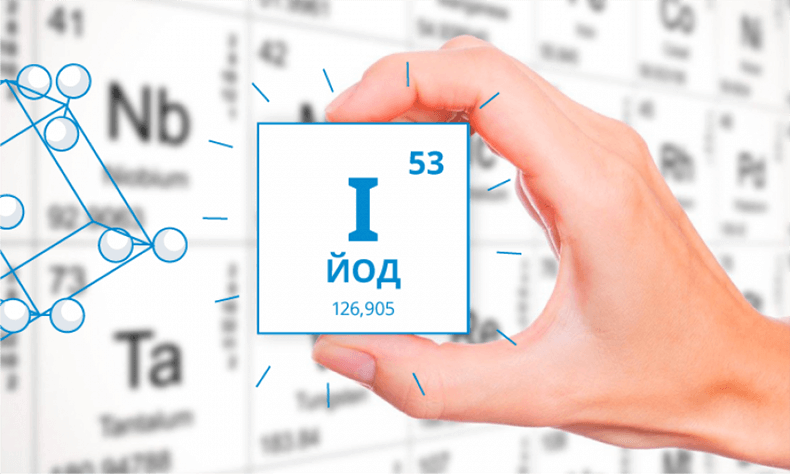The thyroid gland plays a critical role in the human body, responsible for numerous functions related to energy and metabolism. It is located in the front of the neck and produces two primary hormones – thyroxine (T4) and L-triiodothyronine (T3).
The thyroid hormones produced by the thyroid gland control the rate of metabolism, which is responsible for converting food into energy. They affect nearly all cells and tissues in our body, regulating the processes of growth, development, and functioning of various organs and systems, including the cardiovascular, nervous, and muscular systems.
Iodine plays an important role in the production of thyroid hormones and is a key element in its molecular structure. If you feel fatigued, it may be one of the first signs of iodine deficiency. Persistent low levels of iodine can lead to the development of autoimmune thyroid diseases.
Symptoms of iodine deficiency
Symptoms of iodine deficiency include decreased thyroid hormone levels, known as hypothyroidism, which can lead to reduced energy, fatigue, depression, skin and hair problems, as well as weight gain. On the other hand, excessive production of thyroid hormones (hyperthyroidism) can cause nervousness, irritability, heart problems, and fluctuations in body weight.
To maintain normal thyroid function, it is important to ensure optimal iodine intake. Iodine is crucial for the production of thyroid hormones, and without it, the thyroid gland cannot function properly. Iodine deficiency can lead to various issues, including an enlarged thyroid gland and various thyroid disorders.
If iodine levels are not optimal, you may experience various unpleasant symptoms. Some of these include:
- Low mood
- Increasing fatigue
- Irregular menstruation in women
- Headaches
- Cold intolerance
- Thinning hair
- Shortness of breath
- Brain fog
- Joint stiffness
- Muscle aches
How do iodine levels affect thyroid health?
The thyroid gland, shaped like a butterfly, wraps around the trachea in the neck region. It plays a key role in the production of thyroid hormones. The two main forms of these hormones secreted by the thyroid gland are levothyroxine (T4) and L-triiodothyronine (T3). T4 is the inactive form of the thyroid hormone and is produced solely by the thyroid gland, while T3 is the active form. Both hormones contain iodine. The numbers “3” and “4” reflect the number of iodine molecules in each hormone molecule.
The active thyroid hormone T3 is responsible for:
- Optimizing energy balance
- Regulating metabolism
- Stimulating nutrient absorption
- Regulating body temperature
- Maintaining normal functioning of the nervous system
- Regulating growth and development
- Regulating cardiovascular function
Iodine deficiency leads to reduced thyroid function. Prolonged iodine deficiency increases the risk of developing autoimmune thyroid diseases. Therefore, it is crucial to maintain normal iodine levels in the body.
Who is at risk of iodine deficiency?
In the past, iodine deficiency was not as widespread, but it is becoming an increasingly common problem. People who follow a healthy diet that includes replacing table salt with sea salt are at higher risk of iodine deficiency. This is because table salt is iodized.
Other factors that can increase the risk of iodine deficiency include:
- Frequent consumption of cruciferous vegetables: Cruciferous vegetables like cabbage, cauliflower, and Brussels sprouts contain a compound called goitrin, which can reduce the synthesis of thyroid hormones. This problem only arises if you regularly consume large amounts of raw cruciferous vegetables.
- Tap water: Chlorine and fluoride found in tap water and some bottled waters interfere with iodine absorption. Fluoride is also present in fluoridated toothpaste, which helps prevent tooth decay. If you use fluoridated toothpaste, be careful not to swallow it and rinse your mouth after use.
- Exposure to chemicals: Bromine and bromides are found in various household products and used in the processing of furniture, carpets, mattresses, and upholstery. Bromine can also be found in some over-the-counter medications, foods, and cosmetic products like hair dyes. It is important to check the labels of household products as these chemicals can disrupt the body’s endocrine system responsible for hormone production.
It is important to know that iodine deficiency can be harmful to health and can cause problems with the thyroid gland. If you think you are at risk of iodine deficiency, it is important to seek advice from a doctor or dietitian to receive guidance on maintaining normal iodine levels in your body.
Foods rich in iodine
Foods rich in iodine are generally not abundant in our diet. Some specific food products have sufficiently high levels of iodine to have a positive impact on health. Here are some foods that are rich sources of iodine:
- Sea vegetables and seaweed: This vegetable family ranges from microscopic plankton to massive seaweeds over 1,500 feet long. Although they are one of the most common types of vegetables in the world, most people rarely eat them. Sea vegetables are an excellent source of iodine. They include seaweeds like kelp, nori, and others. They provide 10 to 20 times more minerals than land plants. Seaweeds have been used for centuries as a culinary ingredient in Chinese, Japanese, and Korean cuisine. They contain significant amounts of iodine, with kelp being particularly rich in it. Sea algae like spirulina and chlorella are also sources of iodine and other beneficial nutrients.
- Organic vegetables: Vegetables grown in mineral-rich soil without exposure to pesticides can also be an excellent source of iodine. Particularly beneficial are organic vegetables consumed soon after harvesting, as they contain more minerals and nutrients, including iodine.
- Mussels: Mussels are a seafood delicacy and are rich in nutrients, including iodine. Consuming them can provide an adequate amount of iodine to maintain the health of the thyroid gland and overall well-being. Mussels are also a source of other beneficial nutrients such as proteins, vitamins, and minerals.
- Maca root: Maca is a plant native to Peru, and its roots are used for direct consumption or in the form of dietary supplements. Maca extract is known for its immune-stimulating properties and is one of the richest sources of iodine.
- Fish: Some fish like cod, haddock, and pollock have higher iodine content than fattier fish like salmon. Low-fat fish provides the highest levels of iodine.
Think about additional iodine intake
If obtaining optimal levels of iodine through food is a challenge for you, you may consider additional intake through dietary supplements. Iodine supplements are available in two main forms – topical and oral. Both can increase iodine levels in the body.
- Topical forms of iodine are applied directly to the skin. They are quickly and easily absorbed by the body, but the dosage may not be precise and can vary.
- The oral form of iodine is easier to dose and is preferred. Iodine is usually taken in the form of a liquid that can be consumed directly or added to a beverage of choice.
Frank Fruities’ gummy supplements are a delicious and beneficial option for supplying the body with essential nutrients, including iodine. Frank Fruities offers high-quality dietary supplements that are tasty and enjoyable to use. Gummy formulas are suitable for people seeking an alternative to tablets and capsules. They provide a pleasant and flavorful way to obtain important vitamins and minerals.
Sources:
- Patrick L. Iodine: deficiency and therapeutic considerations. Altern Med Rev. 2008;13(2):116-127.
- Zimmermann MB, Andersson M. Prevalence of iodine deficiency in Europe in 2010. Ann Endocrinol (Paris). 2011;72(2):164-166. doi: 10.1016/j.ando.2011.03.023
- Fenwick GR, Heaney RK, Mullin WJ. Glucosinolates and their breakdown products in food and food plants. Crit Rev Food Sci Nutr. 1983;18(2):123-201.
- Nerhus I, Wik Markhus M, Nilsen BM, et al. Iodine content of six fish species, Norwegian dairy products and hen’s egg. Food Nutr Res. 2018;62:10.29219/fnr.v62.1291. doi: 10.29219/fnr.v62.1291


